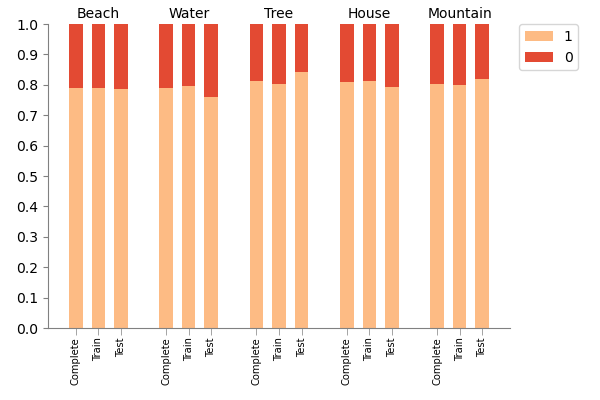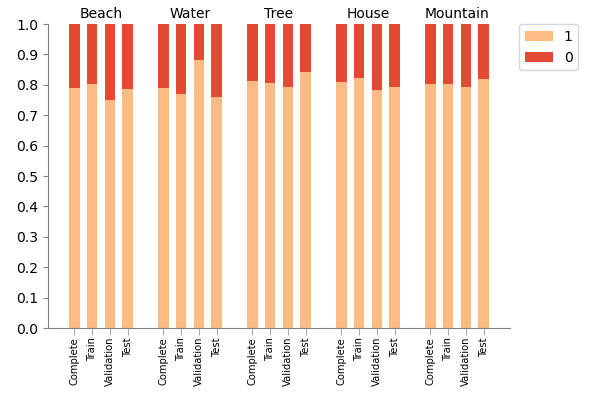maestros is a Python library that provides functionality for performing multi-label stratified group splits. This library is particularly useful for machine learning tasks involving multi-label data with grouped samples, where the train and test sets need to be stratified to maintain the label distribution, while ensuring the groups are disjoint. The multi-label stratification is done through the iterative-stratification library. The included stratification chart and report can also be used for multi-label data where samples do not belong to groups.
- Perform multi-label stratified group splits, ensuring that groups are disjoint.
- Create stratification reports to analyze the distribution of labels across the complete dataset and the train and test sets.
- Visualize the stratification results using a chart.
- Features adapt when a validation set is included.
- Easy-to-use with mock data generation for testing purposes.
Install the maestros package using pip:
pip install maestrositerative_stratification==0.1.7
matplotlib==3.5.3
numpy==1.22.3
pandas==1.5.1
scikit_learn==1.0.2
Import the needed functions from the library.
from maestros import *Load your own data or do a first test with create_mock_data. Optionally include label names.
# Create multi-label samples, each belonging to one of the 5 groups
X, y, groups = create_mock_data(n_samples=500, n_labels=5, n_features=4, n_groups=5, seed=42)
# Define the labels that should be displayed in the report and the chart
labels = ['Beach', 'Water', 'Tree', 'House', 'Mountain']Perform the multilabel stratified group split (optionally done twice to create a validation set).
X_train, X_test, y_train, y_test, train_indices, test_indices = multilabel_stratified_group_split(X, y, groups, test_size=0.2, random_state=42, shuffle=True)
While the groups created with this tool are always disjoint, this can be checked with check_disjoint_groups. This can also be useful if you have created splits in other ways.
check_disjoint_groups(train_indices, test_indices, groups)Print a stratification report.
stratification_report(y, y_train, y_test, labels=labels)
The label distribution shows the percentage of class '1' samples of the complete, training, (validation) and test set. The difference shows how much the distribution of a set differs from that of the complete set. A mean difference closer to 0 is a better stratified set.
Label distribution:
Label Complete Train Test
Beach 0.789 0.787 0.795
Water 0.799 0.799 0.800
Tree 0.824 0.833 0.790
House 0.770 0.775 0.751
Mountain 0.818 0.806 0.863
Differences:
Label Train-Complete Test-Complete
Beach 0.002 0.006
Water 0.000 0.001
Tree 0.009 0.034
House 0.005 0.019
Mountain 0.012 0.045
Mean Differences:
Train-Complete: 0.005
Test-Complete: 0.021
Plot the stratification chart.
create_stratification_chart(y, y_train, y_test, labels=labels)
To include a validation set, simply execute the multilabel-stratified-group-split twice: once to create train_val and test sets, and once to create a train and test set from train_val. For the stratification report and chart, include y_val when calling the function.
# First, split the data into 80% train+val and 20% test
X_train_val, X_test, y_train_val, y_test, train_val_indices, test_indices = multilabel_stratified_group_split(
X, y, groups, test_size=0.2, random_state=42, shuffle=True
)
# Define groups of train_val
groups_train_val = groups[train_val_indices]
# Next, split the train_val data into 75% train and 25% validation (resulting in 60% train, 20% val, and 20% test)
X_train, X_val, y_train, y_val, train_indices, val_indices = multilabel_stratified_group_split(X_train_val, y_train_val, groups_train_val, test_size=0.25, random_state=42, shuffle=True)
# Stratification report with validation set
stratification_report(y, y_train, y_test, y_val=y_val, labels=labels)
# Stratification chart with validation set
create_stratification_chart(y, y_train, y_test, y_val=y_val, labels=labels)
Stratification report with validation set included:
Label distribution:
Label Complete Train Val Test
Beach 0.788 0.801 0.750 0.785
Water 0.788 0.770 0.880 0.760
Tree 0.812 0.805 0.793 0.843
House 0.808 0.822 0.783 0.793
Mountain 0.804 0.801 0.793 0.818
Differences:
Label Train-Complete Val-Complete Test-Complete
Beach 0.013 0.038 0.003
Water 0.018 0.092 0.028
Tree 0.007 0.019 0.031
House 0.014 0.025 0.015
Mountain 0.003 0.011 0.014
Mean Differences:
Train-Complete: 0.011
Val-Complete: 0.037
Test-Complete: 0.018
Stratification chart with validation set included:
This project is licensed under the MIT License - see the LICENSE file for details.

